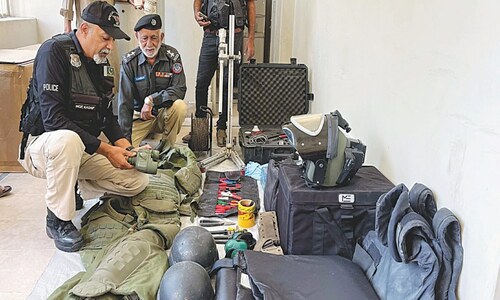KARACHI, Oct 29: “Democracy and secularism are not in contradiction with Islam” was the point underlined by Dr Ihsan Yilmaz during an interactive session titled ‘Contemporary Turkish Politics in the Light of State-Law Relations’ at the Pakistan Institute of International Affairs’ library on Saturday.
Dr Yilmaz is the associate professor of political science at Fatih University, Istanbul.
In the beginning of his talk, Dr Yilmaz said that Turkish experience was unique because it had democracy and secularism and the large population of practising Muslims had come to terms with secularism and democracy. He said the Turkish experience could be an inspirational role model for the rest of the Muslim countries, because now political Islamists in his country were operating within the parameters of constitutional framework. He said it was important to understand that the Turkish experience was not anti-Islam.
Going back in history, Dr Yilmaz said the Ottomans were pluralistic and theirs was a kind of a secular system; they were practising Muslims. The Ottoman Empire wasn’t different from any other empire in the West, and the things that they adopted — succession of monarchy, son could inherit father’s throne, etc — were secular. Sultan Mehmud II, he said, enacted secular laws. He said in Islam you could legislate according to local understanding. He informed the audience that 19th century Ottomans were educated in Western universities and were not against Islam.
Dr Yilmaz re-emphasised that democracy wasn’t against Islam. Islam was about free choice. If you didn’t have intellect you couldn’t be a responsible servant of God, so freedom of choice was important. Why that couldn’t be applied to politics, he asked. God trusted humans with intellect. He said that Sulaiman the Magnificent was secular. He said shariah meant ‘to do business with consultation’.
He conceded though that the Ottomans weren’t angels; they had their share of mistakes. But they did things (for example, gave rights to the minorities) which the West started doing only in the 20th century. Quoting a Turkish scholar, he said the focus was on continuation. The republic of Turkey was a secular and democratic country. There was continuity between the Ottomans and Turkey.
Dr Yilmaz said the Ottomans challenged the Sultan’s rule using Islamic concepts under the influence of West, but couldn’t say that in public sphere. They skillfully used Islamic ideas and instead of saying parliament termed it shura. He told the gathering that political Islamists in today’s Turkey had pluralistic, parliamentary basis and theirs wasn’t a reaction against the West’s hegemony.
Dr Yilmaz said initially mistakes were made in the secular Turkey and females weren’t allowed to cover their heads. Owing to such misinterpretations Turkey lost a lot of its energy. Now things had changed. Political Islamists in Turkey were never pro-violence. Muslim scholars were pro-pluralism. He maintained that religion shouldn’t be mixed with politics, it only harmed religion itself. He argued that a distinguished Muslim scholar in his thesis Maqasid-al Sharia gave the following five reasons for Islamic law (1) protection of life (2) protection of intellect (3) protection of family life (4) protection of religion — all religions (5) protection of property, which was compatible to modern-day concept of human rights. He said in the recent victory of the current ruling party in Turkey, in 50 per cent of the votes cast in its favour half of the people didn’t have anything to do with religion. Even Armenians voted for the Justice and Development Party.
Replying to a question during the question-answer session, Dr Yilmaz the Kurdish issue was a complicated one. During the military regime’s tenure in particular they were victimised and their language was banned.













































Dear visitor, the comments section is undergoing an overhaul and will return soon.